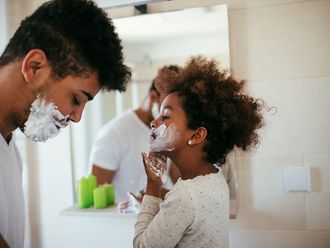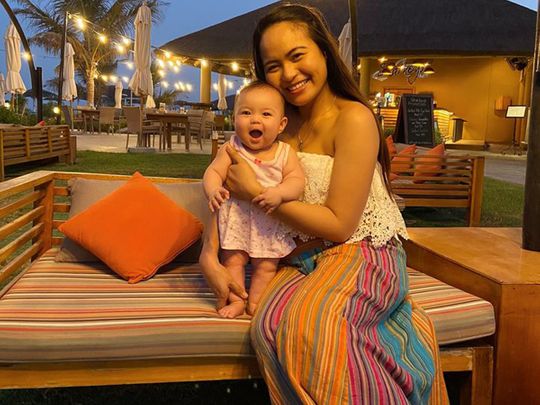
When Filipina cabin crew attendant Chinie Jane Ching - aka Chin Chin - first heard about baby Ruben, she knew she had to do something. Delivered in a Dubai hospital weighing just 1.7kg, the baby boy lost his mother to COVID-19 on the same day that he was born.
As the new mum of a baby around the same age as Ruben, this moved Chin Chin intensely. “He never had a chance to hug or kiss his mother, and I cannot imagine how heartbreaking it is,” she says.
Chin Chin was breastfeeding her infant daughter, Samantha Isobel, and had an oversupply of milk, which she had been freezing for future use. Perhaps, she thought, this was a way she could help.
Having heard about baby Ruben via Heather Harries - the founder of kindness initiative Stop & Help , which vets and connects families-in-need with those who are able to donate groceries or other necessities – Chin Chin offered to donate her frozen breastmilk, to help feed the baby and give him the well-documented nutritional and immunity-boosting benefits of natural human breastmilk.
Ruben’s family accepted, and within two months - thanks to the milk donated by Chin Chin and some other mothers - the baby boy had gained weight to be over 3kg and was thriving in the care of his auntie and father. “It is my great pleasure to be one of Baby Ruben’s mums here on earth,” says Chin Chin.
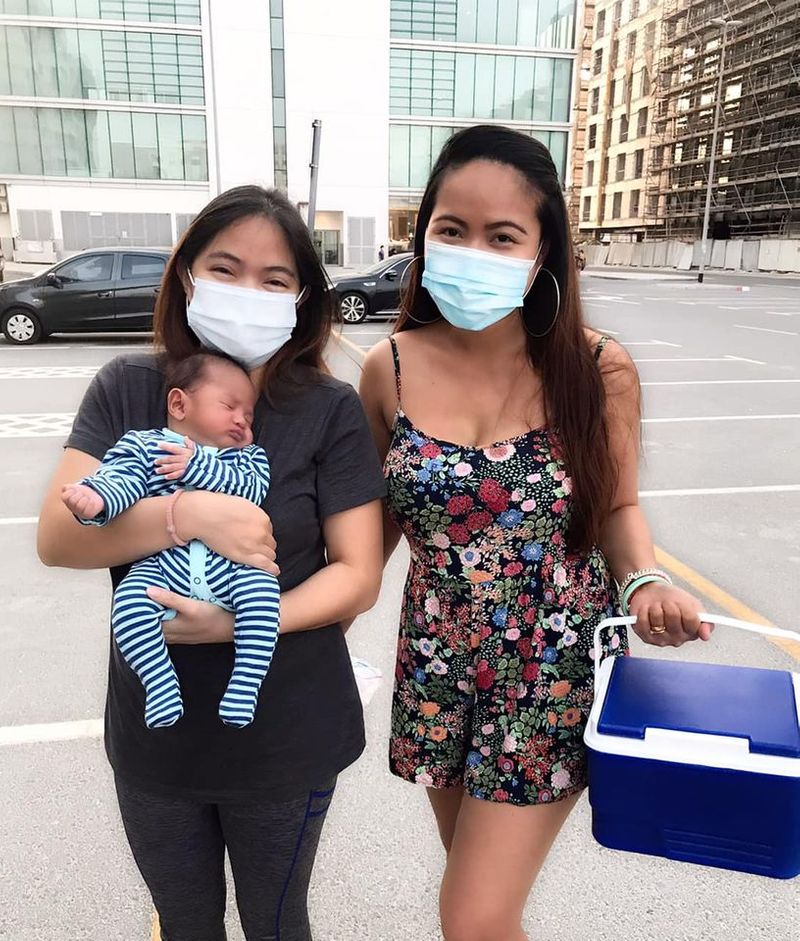
A ‘Cow Mama’
It is four months since Chin Chin started pumping and donating breastmilk, and she has now donated 200 litres of breastmilk to babies who have lost their mothers in the UAE.
She and her husband have created quite a system of help in their cosy Dubai apartment.
Dubbing herself a ‘cow mama’, Chin Chin feeds her own daughter and then expresses milk using an electric breast pump every three to four hours, around the clock – getting 150ml to 400ml at a time - which she then labels and pours into milk bags, before storing in a chest freezer. Then every few days she and her husband pack the frozen bags into an ice box, dress up in their protective face masks and shields, and go to personally deliver it to the families they are helping.
It’s something Chin Chin takes enormous pride in. “This global crisis is taking almost everything from us, and it breaks my heart every time I hear a pregnant woman or mother died because of COVID-19, leaving their innocent child here on Earth,” she says.
Chin Chin’s dedication is driven by a desire to help, she says. “I am really trying to connect with families who need help, and I am prioritising the babies who have lost their mummies. As a new mother it breaks my heart knowing this kind of situation. Knowing the health benefits of breastfeeding means I am thinking if this can save lives and create a healthier next generation then I will do it. I don’t mind working hard, having short nights, and not doing the household chores, but this is my way to connect and help the next generation to become better and healthier, and I will do it as long as I can.”
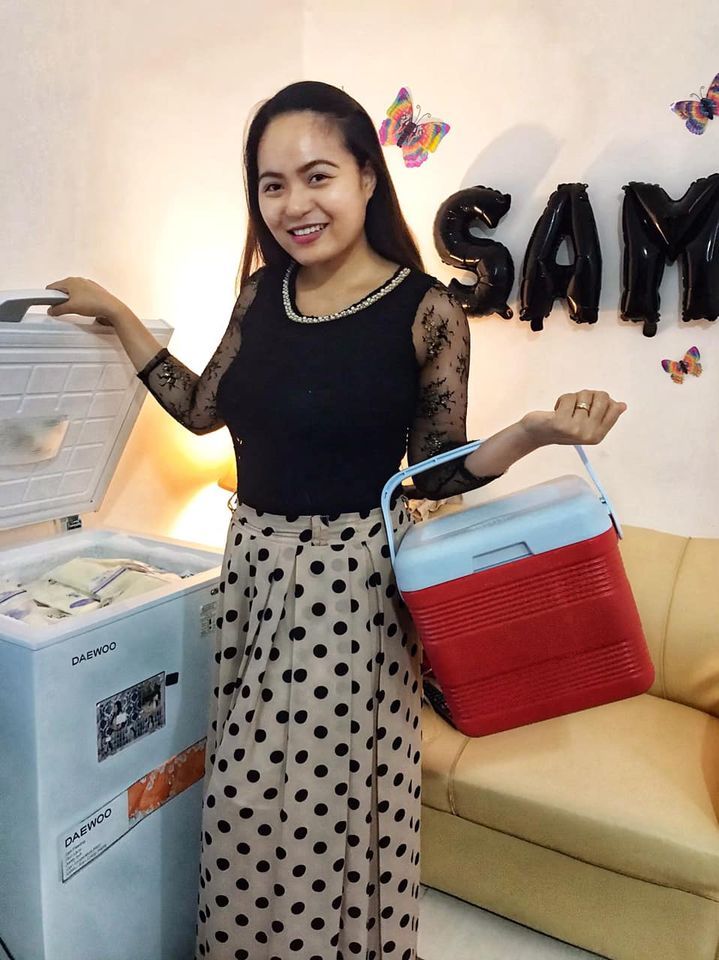
Destined to donate
Chin Chin is passionate about spreading the word about the manifold benefits of breastmilk – especially the highly concentrated and nutrient-dense early milk known as colostrum – and would like to educate people about the importance of breastfeeding.
“I grew up in the South part of the Philippines, where children are usually drinking powdered milk instead of breastmilk,” she says. “There was one mum breastfeeding in our village, and I was amazed by how much money she saved by doing so, and also by how beneficial it is for the baby. It inspired me. I felt this was my ambition that some day when it is my time I am going to donate milk, I was praying for it.”
However, it didn’t look like it was going to be easy for Chin Chin to breastfeed at all. Ten years ago she discovered that she suffers from a kidney disorder, which meant that she was advised to limit her water intake. One of the key prerequisites of breastmilk production is to drink enough water, so Chin Chin was not sure if she would be able to drink enough to give herself a good supply.
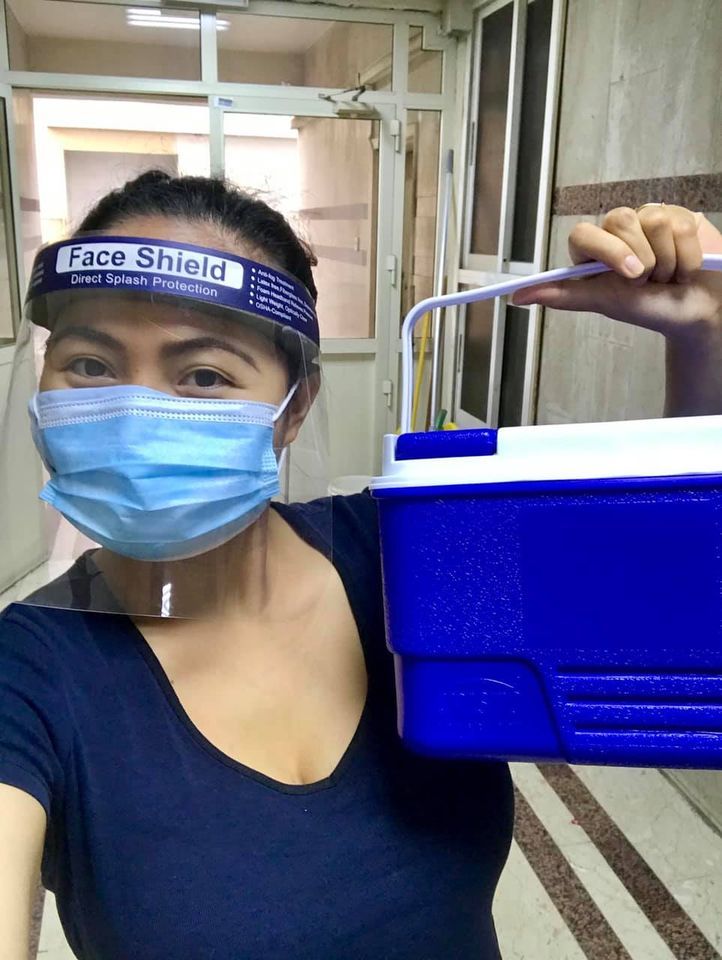
As it turns out, she has been able to take a huge amount of water without any negative impact, drinking at least 8 litres per day. “I feel very blessed to have enough milk to share,” she says. “I thought because of my medical situation this could hinder me, but now every mum is asking me ‘What is your secret to make so much milk?’ I wish I could tell them something more, but it’s just water.”
Chin Chin says she feels it is her duty to help motherless children if she can. “I work hard for it, it takes big-time dedication and perseverance. But I am sharing this gift to inspire more newbie mothers to not quit breastfeeding if possible, to promote breastfeeding, and to connect with and help families who have a newborn who needs my breastmilk.”
“Breastfeeding brings new chances and new hope for the next generation. My only prayer is that these children will be better and stronger than us in continuing the human race.”
Disclaimer: Anyone who is expressing breastmilk for human consumption (their own child included) should follow international guidelines for healthy breastmilk production and safe and hygienic collection, storage and transportation of breastmilk.
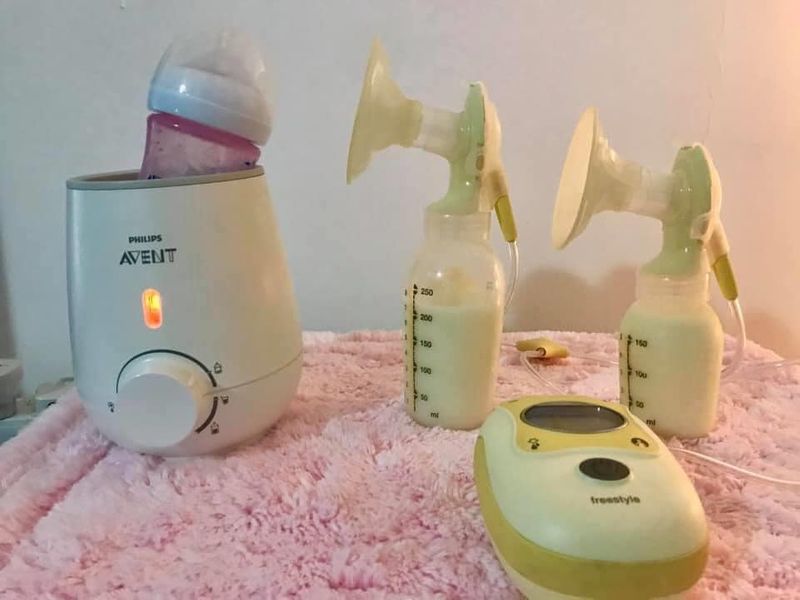
What does Islamic law say about donating breastmilk?
Dubai’s Islamic Affairs and Charitable Activities Department clarifies the rules around breastmilk donation
If an infant loses his mother due to COVID-19, can he or she receive donated breastmilk, according to Shariah law? Gulf News raised the issue with Dubai’s Islamic Affairs and Charitable Activities Department (IACAD) to find out what the Islamic perspective is on breastmilk donation, whether a woman can donate her breastmilk and whether it is different from the concept of a wet nurse.
Fatwa from IACAD on breastmilk donation
Islamic law urges mothers to breastfeed their babies as the mother's milk is very useful for the newborn and helps boost his attachment to his mother. Allah has said in the Quran: “Mothers may breastfeed their children two complete years for whoever wishes to complete the nursing [period]” (Chapter 2, Verse 233). This means mothers have to breastfeed their babies.
However, if the mother does not have enough breastmilk for baby, suffers from low milk supply, is in a senior position and has no time to breastfeeding, or if she died, the Shariah has permitted using a wet nurse, as the Almighty said at the end of the previous verse: “And if you wish to have your children nursed by a substitute, there is no blame upon you as long as you give payment according to what is acceptable.” Allah also said: “but if you are in discord, then there may breastfeed for him another woman.”
And if the mother got infected with COVID-19 and is required to be quarantined, then healthy breastfeeding women should be sought for the infant so that the he does not contract the virus from his mother. If another woman breastfed him, then she will be his foster mother and she is allowed to take a fee for breastfeeding if she does not want to donate. Breastfeeding should take place after the husband's permission.
Islam has set controls and rule for breastfeeding, creating something called the status of Mahram [an individual with whom marriage is prohibited] and the babies are therefore not allowed to marry the nursing mother and her sons, daughters, sisters, brothers and the sons and daughters of her husband who have shared the milk.
According to the Prophet Muhammed (PBUH), “What becomes unlawful (for marriage) through breastfeeding is that which becomes unlawful through lineage.”
So marriage between them is not allowed owing to this breastfeeding. Therefore, whoever feeds a baby directly through her breast or through bottles or breastfeeding devices will be considered the baby’s foster mother.
The milk mother’s sons and daughter will be the baby’s brothers and sisters, the mother’s brothers and sisters will be his uncles and aunts, the mother’s father will be his grandfather, her mother will be his grandmother, her husband will be his stepfather, and her husband’s brother will be his uncle.
However, this kinship will not entitle neither the nursed baby nor his foster mother and her relatives to inheritance or maintenance.
Additionally, the name of the foster mother and the infant, as well as the time and place of breastfeeding, should be recorded so that the consequences of this breastfeeding are known.
- Reported by Huda Tabrez, Senior News Editor, and translated by Tawfiq Nasrallah, Staff Writer



